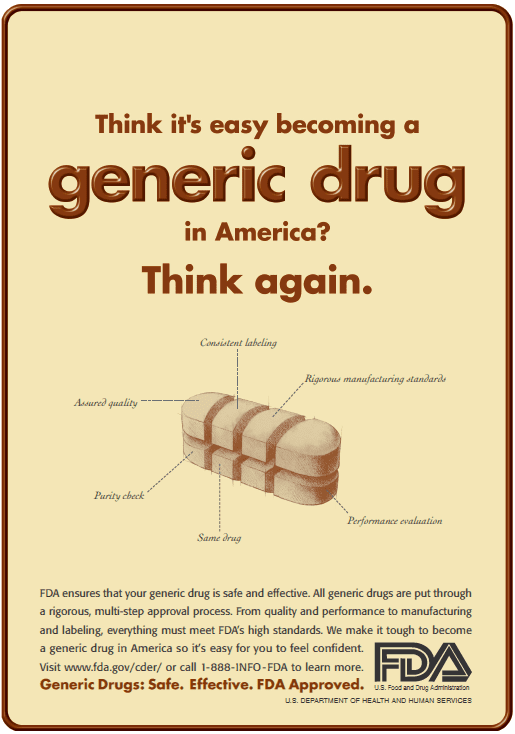Proposed FDA Label Changes Irking Generic Drugmakers

PSA from the FDA on generic drugs. It may be hard to get approval, but generic drug manufacturers are also hard to sue when you’re injured.
Generic drugmakers are increasingly becoming more frightened of the threat of products liability lawsuits because of a proposed rule that would require them to change their labels if the company receives new safety information about the drug. These label changes would overturn a three decade old regime of prohibiting generic drugmakers from updating their labels if the original, brand name drug has not updated its label. For example, if the pharmaceutical company which produced Ambien received new safety information, they would be required to update the labels for Ambien. Generic drugmakers would follow suit and update their labels as well. However, if the generic drugmakers receive new safety information, then they are currently prohibited from updating their zolpidem (generic Ambien) labels. This new rule change would require them to make the change regardless of Ambien’s label.
Basically, this newly proposed rule would place equal responsibility for drug safety monitoring on both the brand name and generic drug producers. Generic drugmakers are, understandably, terrified.
Historically, these generic drugmakers have been protected from many products liability suits because of a 2011 Supreme Court decision. This decision was the product of years of legal wrangling and stated that because of the prohibition on independent generic label changes by the FDA, generic drugmakers could not be held accountable for the lapse in safety monitoring committed by the brand-name manufacturer. As you can imagine, hundreds of thousands if not millions of Americans who ingest generic drugs currently have very little to no legal recourse if they are injured by the drug. In fact, 80% of all prescriptions filled in the United States are generic.
You might be asking yourself why this rule change would make drugs safer for consumers. Under the current system, it seems apparent that the pharmaceutical company who first creates the drug has an incentive to ensure that it’s safe, even after the patent expires. In an ideal world, this might be true. However, we do not live in an ideal world – and after a drug’s patent expires and generic versions of the drug are produced, the brand-name manufacturer loses out on a lot of profit. This loss of profit forces the brand name company to divert resources away from their expired patent and into the creation of a new blockbuster drug. In the words of Public Citizen’s general counsel “As generic market share increases, the brand-name manufacturer loses incentive to devote resources to post-approval safety monitoring.” This rule change also makes sense because there are about 2,000 generic drugs on the market (45% of all generics sold) where there is no longer any brand-name counterpart being manufactured. The FDA, with its limited resources, cannot be expected to monitor the safety of a decades old drug where even the original manufacturer has left the market. That responsibility needs to fall on the companies making money off of the chemical.
We believe that this rule change would transfer responsibility based on market share. When a drug goes generic, generic manufacturers increase their market share. Thus, their share of the responsibility of the safety should increase as well. It’s logical, it’s fair and it makes perfect sense – as long as you aren’t a pharmaceutical company.
Share This


